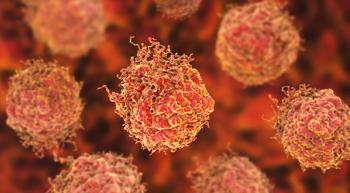
Prostate Cancer
Latest News

Latest Videos

More News

Watch Dr. Tian Zhang, from UT Southwestern Medical Center, discuss novel agents, during the CURE Educated Patient Prostate Cancer Summit.

Watch Dr. Jeremie Calais, from UCLA, discuss novel imaging strategies, during the CURE Educated Patient Prostate Cancer Summit.

Watch Dr. Veda N. Giri, Dr. Umang Swami and Sue Friedman answer questions about genetics and genomics during the CURE Educated Patient Prostate Cancer Summit.

Watch Dr. Umang Swami, from Huntsman Cancer Institute, discuss genomic changes and PARP inhibitors, during the CURE Educated Patient Prostate Cancer Summit.

Watch Dr. Veda N. Giri, from Sidney Kimmel Cancer Center at Thomas Jefferson University, discuss genetic testing and who should get it, during the CURE Educated Patient Prostate Cancer Summit.

Watch Dr. Ganesh Raj, Dr. Andrew Z. Wang, and Bruce Williams, discuss treatment for localized disease, during the CURE Educated Patient Prostate Cancer Summit.

Watch Dr. Andrew Z. Wang, from UT Southwestern Medical Center, discuss approaches to radiation for local disease, during the CURE Educated Patient Prostate Cancer Summit.

Watch Dr. Ganesh V. Raj, from UT Southwestern Medical Center, discuss surgery for localized disease, during the CURE Educated Patient Prostate Cancer Summit.

From chef Gordon Ramsay sharing a meal with a 13-year-old fan with Ewing sarcoma, to a dermatologist on a playground spotting a mother’s skin cancer, here’s a look at what’s happening in the cancer space this week.

An overview of metastatic castration-resistant prostate cancer (mCRPC) and the role of PSMA in mCRPC.


Despite Latino and Hispanic men being more likely to present with higher-risk prostate cancer, they are less likely to receive treatment for their disease compared to other ethnicities.

After experiencing cancer, I feel a profound sense of empathy for others in tough situations, from the war in Ukraine to COVID-19.

Treatment with androgen deprivation therapy in combination with Zytiga, docetaxel and prednisone improved radiographic progression-free survival and overall survival in patients with de novo metastatic castration-sensitive prostate cancer.

Results from a phase 3 trial showed that the combination of Nubeqa, docetaxel and androgen-deprivation therapy significantly decreased the risk of death for men with a certain type of prostate cancer.

While a higher risk of heart issues was found in older men years after androgen-deprivation therapy, it is unknown if the risk comes from the treatment or other age-related comorbidities.

John Wayne coined the term, “the Big C,” for cancer, but I think it’s time that the capital letter C stands for something better.

From Philadelphia Flyers’ employees suing the organization after developing a rare blood cancer to experts proposing a new name for low-risk prostate cancer and an actor on Disney+’s “The Mandolorian” dying of cancer, here’s what is happening in the cancer space this week.

The primary focus of the trial is to evaluate the incidence of treatment-emergent and serious side effects in patients receiving either the novel drug alone or in combination with Keytruda.

From liver cancer survivor planning to run the upcoming Boston Marathon with his organ donor to a common HIV drug showing promise in treating colorectal cancer, here’s what’s happening in the cancer space this week.

A recently FDA-approved drug offers patients with metastatic castration-resistant prostate cancer a newer treatment that improves survival, but is not curative of the disease, which means that more research is needed, according to an expert.

Patients with PSMA-positive metastatic castration-resistant prostate cancer can now be treated with Pluvicto, which may provide hope to an unmet need in this patient population.

From two celebrity deaths due to cancer to leading American cancer organizations coming together to help patients with cancer fleeing Ukraine, here’s what’s happening in the cancer space this week.

In a news release, Merck advised patients enrolled on the trial to consult with their health care provider regarding their treatment.

Regardless of a man’s age, providing care to a partner or family member with cancer has been shown to take a drastic toll on their health. To make matters worse, research shows many men struggle in silence.














